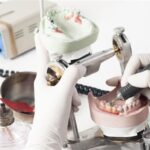Becoming a skilled dental lab technician involves a combination of formal education, hands-on training, and continuous professional development. Here is a comprehensive guide on the training and education needed to pursue this career:
1. Understand the Role of a Dental Technician
Dental technicians, also known as dental laboratory technicians, create dental prosthetics like crowns, bridges, dentures, and orthodontic appliances. They work closely with dentists to ensure that these devices fit patients properly and function well.
2. Educational Requirements
- High School Diploma or Equivalent: A high school diploma is the basic requirement. Courses in biology, chemistry, and art can be beneficial.
- Formal Education: Enroll in a dental laboratory technology program. These programs are offered at community colleges, technical schools, and universities. They typically last two years and culminate in an associate degree or a certificate.
3. Dental Laboratory Technology Program
These programs cover:
- Dental Anatomy: Understanding the structure and function of teeth and gums.
- Materials Science: Knowledge of materials used in dental prosthetics, such as metals, ceramics, and resins.
- Laboratory Procedures: Techniques for creating various dental devices, including crowns, bridges, and dentures.
- Computer-Aided Design (CAD) and Computer-Aided Manufacturing (CAM): Training in digital technologies used in modern dental labs.
4. Hands-On Training
Practical experience is crucial. This can be gained through:
- Internships/Externships: Many educational programs include internships where students work in real dental labs under supervision.
- On-the-Job Training: After formal education, many technicians continue to learn on the job, often starting with simpler tasks and progressing to more complex procedures.
5. Certification and Licensure
- Certification: While not always required, certification can enhance job prospects. The National Board for Certification in Dental Laboratory Technology (NBC) offers the Certified Dental Technician (CDT) credential. To earn this, candidates must pass a series of written and practical exams.
- Licensure: Some states require dental technicians to be licensed. Check the specific requirements for your state.
6. Continuing Education
Dental technology is an evolving field. Stay updated by:
- Continuing Education Courses: Many professional organizations offer courses to help technicians keep up with new technologies and techniques.
- Professional Associations: Join organizations such as the National Association of Dental Laboratories (NADL) for networking opportunities, resources, and continuing education.
7. Skills Development
Key skills for dental technicians include:
- Attention to Detail: Precision is essential in creating dental devices.
- Manual Dexterity: Good hand-eye coordination and the ability to work with small tools and materials.
- Creativity and Artistic Ability: Aesthetic considerations are important for creating devices that look natural.
- Technical Skills: Proficiency with tools, equipment, and computer software used in dental laboratories.
8. Career Advancement
With experience and additional training, dental technicians can advance to supervisory or managerial positions. Some may choose to specialize in a particular area, such as ceramics or orthodontic appliances, or open their own dental laboratories.
By following this path and continually improving their skills and knowledge, individuals can become proficient and respected dental technicians.

